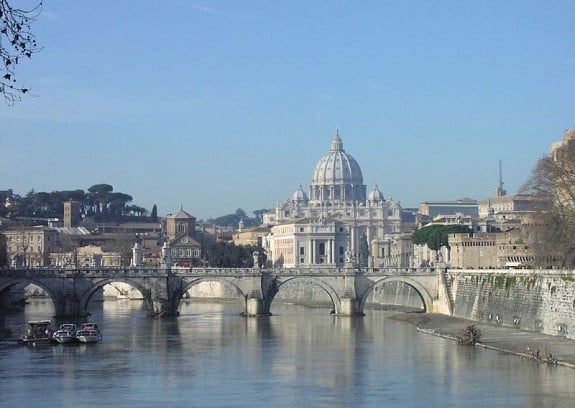In the current edition of the catechism, the teaching on the death penalty reads:
2267 Assuming that the guilty party’s identity and responsibility have been fully determined, the traditional teaching of the Church does not exclude recourse to the death penalty, if this is the only possible way of effectively defending human lives against the unjust aggressor.
If, however, non-lethal means are sufficient to defend and protect people’s safety from the aggressor, authority will limit itself to such means, as these are more in keeping with the concrete conditions of the common good and more in conformity to the dignity of the human person.
Today, in fact, as a consequence of the possibilities which the state has for effectively preventing crime, by rendering one who has committed an offense incapable of doing harm – without definitely taking away from him the possibility of redeeming himself – the cases in which the execution of the offender is an absolute necessity “are very rare, if not practically nonexistent.”
But the new draft by Pope Francis (which you can read below) removes any “absolute necessity,” along with any conditions that might allow “recourse to the death penalty.” It casts the Church’s historic teaching on the death penalty in the past tense, and declares now that in all circumstances, for all crimes, the death penalty is “inadmissible.”
This development is huge:
Pope Francis has changed the Catholic Church’s teaching on the death penalty, concluding it is always wrong as it “attacks” human dignity.
The Vatican announced that Francis had changed the catechism of the church — the compilation of official Catholic teaching.
Previously, the catechism said the church didn’t exclude recourse to capital punishment “if this is the only possible way of effectively defending human lives against the unjust aggressor”.
The new teaching says the previous policy is outdated and that there are other ways to protect society.
“Consequently the church teaches, in the light of the Gospel, that the death penalty is inadmissible because it is an attack on the inviolability and dignity of the person, and she works with determination for its abolition worldwide,” it says.
From the Vatican website:
The death penalty
2267. Recourse to the death penalty on the part of legitimate authority, following a fair trial, was long considered an appropriate response to the gravity of certain crimes and an acceptable, albeit extreme, means of safeguarding the common good.
Today, however, there is an increasing awareness that the dignity of the person is not lost even after the commission of very serious crimes. In addition, a new understanding has emerged of the significance of penal sanctions imposed by the state. Lastly, more effective systems of detention have been developed, which ensure the due protection of citizens but, at the same time, do not definitively deprive the guilty of the possibility of redemption.
Consequently, the Church teaches, in the light of the Gospel, that “the death penalty is inadmissible because it is an attack on the inviolability and dignity of the person”,[1] and she works with determination for its abolition worldwide.
_______________________
[1] Francis, Address to Participants in the Meeting organized by the Pontifical Council for the Promotion of the New Evangelization, 11 October 2017: L’Osservatore Romano, 13 October 2017, 5.
And there’s this letter released today to bishops:
1. The Holy Father Francis, in the Discourse on the occasion of the twenty-fifth anniversary of the publication of the Apostolic Constitution Fidei Depositum , with which John Paul II promulgated the Catechism of the Catholic Church , called for reformulation of the teaching on the death penalty, so to better gather the development of the doctrine that has taken place on this point in recent times. [1] This development rests principally on the ever clearer conscience in the Church of respect due to every human life. In this line John Paul II affirmed: “Even the murderer loses his personal dignity and God himself guarantees it”.[2]
2. In this light we must understand the attitude towards the death penalty which has become increasingly affirmed in the teaching of pastors and in the sensibility of the people of God. If, in fact, the political and social situation of the past rendered the penalty of death an acceptable instrument for the protection of the common good, today the ever-growing awareness that the dignity of a person is not lost even after committing very serious crimes, a thorough understanding of the meaning of the penal sanctions applied by the State, and the mass at the point of more effective detention systems that ensure the proper defense of citizens, have given rise to a new awareness that recognizes its inadmissibility and therefore calls for its abolition.
3. In this development the teaching of the Encyclical Letter Evangelium vitae of John Paul II is of great importance . The Holy Father included among the signs of hope of a new civilization of life “the increasingly widespread aversion of public opinion to the death penalty even as an instrument of” social self-defense “, in consideration of the possibilities available to a modern society to effectively repress the crime in ways that, while making the person who committed it harmless, do not definitively remove the possibility of redeeming it ».[3] The teaching of Evangelium vitae was then collected in the editio typica of the Catechism of the Catholic Church . In it, the death penalty does not present itself as a punishment proportionate to the gravity of the crime, but justifies itself only if it was “the only viable way to effectively defend the life of human beings from the unjust aggressor”, even if in fact ” the cases of absolute need to suppress the offender are now very rare, if not even non-existent “(No. 2267).
4. John Paul II also intervened on other occasions against the death penalty, appealing both to respect for the dignity of the person and to the means that the society possesses in order to defend itself from the criminal. Thus, in the Christmas Messageof 1998, he hoped “in the world the consensus towards urgent and adequate measures … to ban the death penalty”.[4] The following month, in the United States, he repeated: “A sign of hope is the growing recognition that the dignity of human life must never be denied, even to those who have done wrong. Modern society has the tools to protect itself without definitively denying criminals the possibility of repenting. I renew the appeal launched at Christmas, so that it is decided to abolish the death penalty, which is cruel and useless “.[5]
5. The drive to commit oneself to the abolition of the death penalty continued with the successive Pontiffs. Benedict XVI recalled “the attention of the leaders of society on the need to do everything possible to achieve the elimination of the death penalty”.[6]And then he hoped to a group of faithful that “your deliberations may encourage the political and legislative initiatives, promoted in an increasing number of countries, to eliminate the death penalty and continue the substantial progress made to adapt the criminal law both to the demands of the human dignity of prisoners that the effective maintenance of public order “.[7]
6. In this same perspective Pope Francis reiterated that “today the death penalty is inadmissible, however serious the crime of the condemned man was”.[8] The death penalty, whatever the manner of execution, “implies a cruel, inhuman and degrading treatment”.[9] It should also be refused “because of the defective selectivity of the penal system and the possibility of judicial error”.[10] It is in this light that Pope Francis asked for a revision of the formulation of the Catechism of the Catholic Church on the death penalty, so that it is affirmed that “however serious the crime may have been, the death penalty is inadmissible because attentive to the inviolability and dignity of the person “.[11]
7. The new draft of the n. 2267 of the Catechism of the Catholic Church , approved by Pope Francis, is situated in continuity with the previous Magisterium, carrying forward a coherent development of Catholic doctrine.[12] The new text, following in the footsteps of John Paul II’s teaching in Evangelium vitae, affirms that the suppression of the life of a criminal as punishment for a crime is inadmissible because it is attentive to the dignity of the person, dignity that is not lost even after having committed serious crimes. This conclusion is reached also taking into account the new understanding of the penal sanctions applied by the modern state, which must be oriented first of all to the rehabilitation and social reintegration of the criminal. Finally, given that today’s society has more effective systems of detention, the death penalty is unnecessary as a protection of the lives of innocent people. Of course, the duty of public authority to defend the lives of citizens remains, as has always been taught by the Magisterium and as confirmed by the Catechism of the Catholic Churchin numbers 2265 and 2266.
8. All this shows that the new formulation of n. 2267 of the Catechism expresses an authentic development of the doctrine, which is not in contradiction with the previous teachings of the Magisterium. In fact, these can be explained in the light of the primary responsibility of the public authority to protect the common good, in a social context in which the penal sanctions were understood differently and took place in an environment where it was more difficult to guarantee that the criminal could not reiterate his crime.
9. In the new wording we add that awareness of the inadmissibility of the death penalty has grown “in the light of the Gospel”.[13] The Gospel, in fact, helps to better understand the creatural order that the Son of God has assumed, purified and brought to fullness. He also invites us to the mercy and patience of the Lord who gives everyone time to convert.
10. The new formulation of n. 2267 of the Catechism of the Catholic Church wants to be a push to a firm commitment, also through a respectful dialogue with the political authorities, so that a mentality is recognized that recognizes the dignity of every human life and the conditions are created that allow today to eliminate the legal institution of the death penalty where it is still in force.
The Supreme Pontiff Francis, in the Audience granted to the undersigned Secretary on 28 June 2018, approved this Letter, decided by the Ordinary Session of this Congregation on 13 June 2018, and ordered its publication.
Given in Rome, by the See of the Congregation for the Doctrine of the Faith, August 1, 2018, Memory of St. Alphonsus Maria de ‘Liguori.
Luis F. Card. Ladaria, SI
Prefect
+ Giacomo Morandi
Archbishop of Cerveteri
Secretary
___________________________
[1] Cf. Francesco, Address to the participants at the meeting promoted by the Pontifical Council for the Promotion of the New Evangelization (11 October 2017): L’Osservatore Romano (13 October 2017), 4.
[2] John Paul II, Lett. Enc. Evangelium vitae (March 25, 1995), n. 9: AAS 87 (1995), 411.
[3] Ibid. , n. 27: AAS 87 (1995), 432.
[4] John Paul II, Urbi et Orbi Message for the Holy Christmas (December 25, 1998), n. 5: Teachings XXI, 2 (1998), 1348.
[5] Id., Homily in the Trans World Dome of St. Louis (January 27, 1999): Teachings XXII, 1 (1999), 269; cf. Homily at the Mass in the Basilica of Nuestra Señora de Guadalupe in Mexico City (January 23, 1999): “The unnecessary appeal to the death penalty must be ended”: Teachings XXII, 1 (1999), 123.
[6] Benedict XVI, Esort. Ap. postsynodal Africae munus (19 November 2011), n. 83: AAS 104 (2012), 276.
[7] Id., General Audience (30 November 2011): Insegnamenti VII, 2 (2011), 813.
[8] Francesco, Letter to the President of the International Commission against the death penalty (20 March 2015): L’Osservatore Romano (20-21 March 2015), 7.
[11] Francis, Address to the participants at the meeting promoted by the Pontifical Council for the Promotion of the New Evangelization (11 October 2017): L’Osservatore Romano (13 October 2017), 5.
[12] Cf. Vincenzo di Lérins, Commonitorium , chap. 23: PL 50, 667-669. In reference to the death penalty, dealing with the specifications of the precepts of the Decalogue, the Pontifical Biblical Commission spoke of “refining” the Church’s moral positions: “With the course of history and the development of civilizations, the Church has also refined its own moral positions regarding the death penalty and war in the name of a cult of human life which it nourishes without ceasing by meditating on Scripture and which increasingly takes on the color of an absolute. What underlies these apparently radical positions is always the same basic anthropological notion: the fundamental dignity of man created in the image of God “( Bible and morality .Biblical roots of Christian action , 2008, n. 98).
[13] Second Vatican Ecumenical Council, Const. Gaudium et spes , n. 4.
[01210-EN.01] [Original text: Italian]













